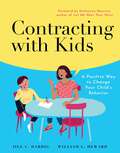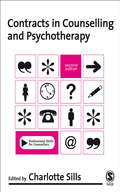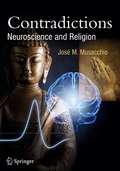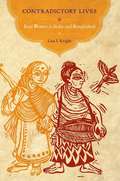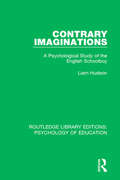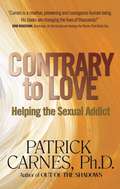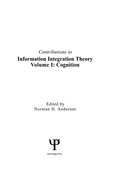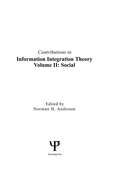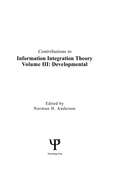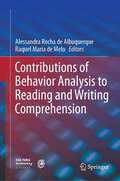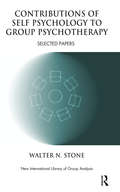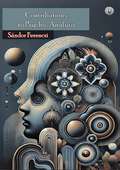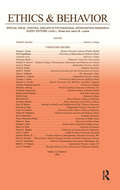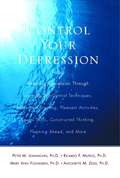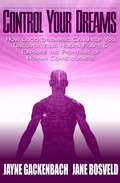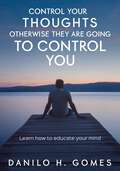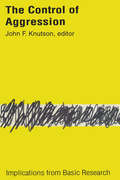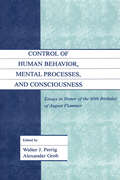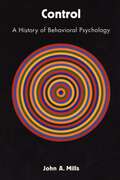- Table View
- List View
Contract Cheating in Higher Education: Global Perspectives on Theory, Practice, and Policy
by Sarah Elaine Eaton Guy J. Curtis Brenda M. Stoesz Joseph Clare Kiata Rundle Josh SeelandThis edited volume—the first book devoted to the topic of contract cheating—brings together the perspectives of leading scholars presenting novel research. Contract cheating describes the outsourcing of students’ assessments to third parties such that the assignments or exams students submit are not their own work. While research in this area has grown over the past five years, the phenomenon has been exacerbated by the COVID-19 pandemic. Themes addressed in this book include the definition of contract cheating, its prevalence in higher education, and what motivates students to engage in it. Chapter authors also consider various interventions that can be used to address contract cheating’s threat to academic integrity in higher education including: assessment practice, education, detection strategies, policy design, and legal interventions.
Contracting With Organized Delivery Systems: Selecting, Evaluating, and Negotiating Contracts (APA Practitioner's Toolbox Series)
by American Psychological AssociationThis manual was written to serve both as a reference and as a tool to help providers practice more efficiently in a changing, demanding marketplace. Discusses terminology, contract evaluation, Payer and Provider Responsibilities. Good tool for therapist considering working with managed care systems.
Contracting with Kids: A Positive Way to Change Your Child's Behavior
by William L. Heward Jill C. Dardig"Colorful and easy to implement, this book will be a resource for parents and guardians looking to try behavior contracting in their homes." —Library Journal When a child is struggling with a behavior challenge or wants to learn a new skill, a contract can be a surprisingly effective solution that leads to more peaceful family dynamics. To help families create contracts as a collaborative process, Contracting with Kids offers an innovative combination of how-to text for parents and illustrated stories for children. Contracting with Kids describes a straightforward, four-step solution called behavioral contracting, a research-based technique with proven real-world success. Contracts are a tool that can benefit anyone, but they&’re particularly useful for: Autistic children Children with learning or developmental disabilities Children who benefit from clear expectations and receiving positive feedback and rewards The book&’s beautifully illustrated stories show a diverse group of families using contracts to address common problems such as: Completing chores or homework Getting along with siblings Becoming independent Achieving personal goals Questions after each story are designed to spark age-appropriate discussions. Sample contracting forms and supporting materials are provided in the book and also on a companion website.
Contracts in Counselling & Psychotherapy (Professional Skills for Counsellors Series)
by Charlotte SillsPraise for the First Edition: `An excellently edited book... It touches upon the core philosophical bases of psychodynamic/psychoanalytic, cognitive and humanistic counselling, and explores the complicated and sometimes contradictory nature of contracting within these approaches... The book is written in an accessible language and often uses very powerful imagery to underline its message... I found this book to be extremely stimulating, accessible and readable. I recommend it to all people interested in counselling, and particularly to students of counselling at all levels' - British Journal of Guidance and Counselling Contracts in Counselling and Psychotherapy, Second Edition is a practical guide to an essential area of professional knowledge and skills. Any kind of therapeutic relationship requires an agreement between practitioner and client at the outset. When contracting with clients, practitioners need to consider a whole range of factors including: " goals of counselling " theoretical orientation " brief or open-ended counselling " different personality types " ethical and legal issues. This book provides a unique guide to the nature of counselling contracts, why they are needed and how they are made. For the second edition, the book has been thoroughly updated to take account of the BACP ethical framework. Two new chapters have been added covering the legal aspects of contracting, and how to make contracts with trainees. Contracts in Counselling and Psychotherapy, Second Edition is an authoritative source of information and practical guidance for trainees and practitioners in counselling and psychotherapy. Charlotte Sills is Visiting Professor at Middlesex University, and Head of Transactional Analysis Department at Metanoia Institute, London
Contradictions: Neuroscience and Religion (Springer Praxis Books)
by José M. Musacchio"Contradictions" is a general interest book that exposes the incompatibility between popular religious beliefs and the scientific view of human nature. It begins with a survey of the evolution of religions and their continuing, often irrational, influences in modern society. Then, based on his long experience in neuroscience, the author takes issue with Decartes about the duality of body and soul. He presents case studies of patients with brain diseases and from these deduces that the soul, far from being separate and supernatural, is no more or less than our way of experiencing our brains ... and which correspondingly disintegrates when they do. Convincing clinical findings and powerful arguments about the universality of truth make this book a bold contribution to the debate about belief and religion in the modern world.
Contradictory Lives: Baul Women in India and Bangladesh
by Lisa I. KnightIn literature and popular imagination, the Bauls of India and Bangladesh are characterized as musical mystics: orange-clad nomads of both Hindu and Muslim backgrounds. They wander the countryside and entertain with their passionate singing and unusual behavior, and they are especiallywell-known for their evocative songs, which challenge the caste system and sectarianism prevalent in South Asia. Although Bauls claim to value women over men, little is known about the individual views and experiences of Baul women. Based on ethnographic research in both the predominantly Hindu context of West Bengal (India) and the Muslim country of Bangladesh, this book explores the everyday lives of Baulwomen. Lisa Knight examines the contradictory expectations regarding Baul women: on the one hand, the ideal of a group unencumbered by societal restraints and concerns and, on the other, the real constraints of feminine respectability that seemingly curtail women's mobility and public performances. Knight demonstrates that Baul women respond to these conflicting expectations in various ways, sometimes adopting and other times subverting local gendered norms to craft meaningful lives. More so than their male counterparts, Baul women feel encumbered by norms. But rather than seeing Baul women'snormative behavior as indicative of their conformity to gendered roles (and, therefore, failures as Bauls), Knight argues that these women creatively draw on societal expectations to transcend their social limits and create new paths.
Contrary Imaginations: A Psychological Study of the English Schoolboy (Routledge Library Editions: Psychology of Education)
by Liam Hudson<
Contrary to Love: Helping the Sexual Addict
by Patrick J CarnesThis resource identifies the stages and progression of sex addiction, including assessment, intervention, and treatment methods.This resource identifies the stages and progression of sex addiction, including assessment, intervention, and treatment methods. It also covers family structure, bonding, boundaries, and recovery topics.
Contributions To Information Integration Theory: Volume 1: Cognition
by Norman H. AndersonThe theory of information integration provides a unified, general approach to the three disciplines of cognitive, social, and developmental psychology. Each of these volumes illustrates how the concepts and methods of this experimentally-grounded theory may be productively applied to core problems in one of these three disciplines.
Contributions To Information Integration Theory: Volume 2: Social
by Norman H. AndersonThe theory of information integration provides a unified, general approach to the three disciplines of cognitive, social, and developmental psychology. Each of these volumes illustrates how the concepts and methods of this experimentally-grounded theory may be productively applied to core problems in one of these three disciplines.
Contributions To Information Integration Theory: Volume 3: Developmental
by Norman H. AndersonThe theory of information integration provides a unified, general approach to the three disciplines of cognitive, social, and developmental psychology. Each of these volumes illustrates how the concepts and methods of this experimentally-grounded theory may be productively applied to core problems in one of these three disciplines.
Contributions of Behavior Analysis to Reading and Writing Comprehension
by Alessandra Rocha de Albuquerque Raquel Maria de MeloThis book shows how behavior analysis can be applied to teaching reading and writing to primary school students and to special populations, such as children with intellectual and hearing disabilities and illiterate adults. Originally published in Portuguese, this contributed volume is now translated into English and presents for the first time to international researchers and students a comprehensive overview of a research program developed for more than three decades in Brazil which gave birth to a unique teaching program based on the concept of stimulus equivalence: the Learning to Read and Write in Small Steps. The book is divided into four parts. The first part presents the theoretical framework and the historical context in which the teaching program was developed by the group led by Drs. Julio Cesar de Rose and Deisy das Graças de Souza, currently organized in the National Institute of Science and Technology on Behavior, Cognition, and Learning (INCT/ECCE). The second part describes the modules that make up the Learning to Read and Write in Small Steps teaching program. The third part presents results of empirical research conducted with children with intellectual and hearing disabilities and illiterate adults. Finally, the fourth part presents contributions from other areas of knowledge – such as speech therapy, linguistics, and education – to the understanding of reading and writing and possible dialogues between them and behavior analysis. Contributions of Behavior Analysis to Reading and Writing Comprehension will be of interest to researchers and students in the fields of psychology and education interested in the application of behavior analysis to teaching and learning processes. It will also be a valuable resource for professionals directly working in educational institutions, such as elementary school teachers and psycho-pedagogues. The translation of the original manuscript in Portuguese was done with the help of artificial intelligence. The present version has been revised technically and linguistically by the authors in collaboration with a professional translator.
Contributions of Self Psychology to Group Psychotherapy: Selected Papers (The New International Library of Group Analysis)
by Walter N. StoneStone's central interests include the development of the self, empathy, narcissism, shame, envy, rage and the group-self. He is concerned with several aspects of clinical technique and is especially sensitive to our co-creation of so-called "difficult patients". His understanding of dreams as both personal and group products which manifest visual narratives will be of particular interest to students of the social and collective unconscious. Stone's work with narcissistic and borderline patients developed in parallel with his work with the chronically mentally ill, who are often institutionalised. He demonstrates that group therapy for such patients is not only a matter of containment and holding in the service of administrative control, but also involves interpretative work based on an understanding of the primary need for a good enough self-object.
Contributions to Psycho-Analysis
by Sándor FerencziContributions to Psycho-Analysis by Sándor Ferenczi is a landmark collection of essays by one of Sigmund Freud’s closest collaborators and a pioneering figure in psychoanalysis. In this influential work, Ferenczi presents his innovative theories on psychological development, therapeutic techniques, and the dynamics of the unconscious mind, expanding on Freud’s foundational ideas while introducing new concepts that have profoundly shaped psychoanalytic thought.Ferenczi’s essays explore a wide range of topics, including trauma, repression, the role of the therapist, and the significance of transference in the therapeutic process. His groundbreaking work on trauma theory introduces the concept of traumatic regression, highlighting how unresolved childhood experiences can manifest in adult behavior. Ferenczi also delves into the complex relationship between therapist and patient, emphasizing the importance of empathy, emotional openness, and mutual understanding in the healing process.A central theme throughout Contributions to Psycho-Analysis is Ferenczi’s belief in the importance of adapting therapeutic methods to meet the unique needs of each patient, challenging rigid, one-size-fits-all approaches. His work foreshadows many modern developments in psychoanalysis, such as the focus on relational dynamics, emotional attunement, and the therapist’s vulnerability.Ferenczi’s writing is marked by clarity, compassion, and intellectual curiosity, making his work accessible not only to psychoanalysts but also to readers interested in psychology and mental health. Contributions to Psycho-Analysis remains essential reading for anyone seeking to understand the evolution of psychoanalytic theory and practice. Ferenczi’s insights continue to inspire therapists and scholars alike, offering timeless wisdom on the complexities of the human mind and the process of emotional healing.
Control Groups in Psychosocial intervention Research: A Special Issue of ethics & Behavior
by Gerald P. KoocherFirst published in 2002. Volume 12, Number 1, 2002 a Special Edition of Ethics and Behavior, covering control groups in Psychosocial intervention research.
Control Your Depression, Rev'd Ed
by Peter LewinsohnDepression is one of the most common of all psychological problems -- nearly all of us experience mild forms of it at sometime during our lifetime. But now, with this easier-to-understand edition of a bestseller that's helped thousands regain their zest for life, you too can learn to feel better without necessarily seeking professional help. Control Your Depression first gives you a clear understanding of the nature of depression -- what it is, what it isn't, and how much is really known about this widespread problem. This valuable guide then helps you pinpoint specific areas related to your own depression: Do you have difficulty dealing with others? Do you often feel anxious or tense? Do you have troublesome thoughts? Are you unhappy at work or in personal relationships? Because not everybody experiences depression in quite the same way, you'll develop a personalized therapeutic program unique to your own situation. Through any number of proven techniques, including relaxation, social-skill enhancement, and modification of self-defeating thinking patterns, you will conquer your feelings of helplessness and alleviate the causes of your distress! Filled with dozens of examples that clearly illustrate difficult yet essential points, Control Your Depression helps you gauge your progress, maintain the gains you make, and also determine whether you need further help. No one who has ever been immobilized by depression should be without this book.
Control Your Depression, Rev'd Ed
by Peter LewinsohnDepression is one of the most common of all psychological problems -- nearly all of us experience mild forms of it at sometime during our lifetime. But now, with this easier-to-understand edition of a bestseller that's helped thousands regain their zest for life, you too can learn to feel better without necessarily seeking professional help.Control Your Depression first gives you a clear understanding of the nature of depression -- what it is, what it isn't, and how much is really known about this widespread problem. This valuable guide then helps you pinpoint specific areas related to your own depression: Do you have difficulty dealing with others? Do you often feel anxious or tense? Do you have troublesome thoughts? Are you unhappy at work or in personal relationships? Because not everybody experiences depression in quite the same way, you'll develop a personalized therapeutic program unique to your own situation. Through any number of proven techniques, including relaxation, social-skill enhancement, and modification of self-defeating thinking patterns, you will conquer your feelings of helplessness and alleviate the causes of your distress!Filled with dozens of examples that clearly illustrate difficult yet essential points, Control Your Depression helps you gauge your progress, maintain the gains you make, and also determine whether you need further help. No one who has ever been immobilized by depression should be without this book.
Control Your Dreams: How Lucid Dreaming Can Help You Uncover Your Hidden Fears & Explore the Frontiers of Human Consciousness
by Jane Bosveld Jayne GackenbachThe authors reveal how dreaming can help you uncover your hidden desires and confront your hidden fears. With exercises and techniques taken from the most up-to-date scientific dream research, readers learn how to use dreaming for creative work, healing, and meditation.
Control Your Thoughts, Otherwise They are Going to Control You: Learn how to educate your mind
by Danilo H. GomesMany Years ago, scientists foreseen that in a very near future, the depression, would be the worst “bad” that would knock down the humanity. They were right. We live in a chaotic world, where we rarely find peace. The day by day agitation transforms quiet minds in noisy spaces. Is your mind going through this? It’s time to do something about it. In this book, you will find great reflections and ways of controlling the voices that permeate your mind's grounds, thoroughly explained. Educate your mind with this book's help and learn to give the due attention to the voices that deserve our focus.
Control as Movement
by Jairo Nunes Cedric Boeckx Norbert HornsteinThe Movement Theory of Control (MTC) makes one major claim: that control relations in sentences like 'John wants to leave' are grammatically mediated by movement. This goes against the traditional view that such sentences involve not movement, but binding, and analogizes control to raising, albeit with one important distinction: whereas the target of movement in control structures is a theta position, in raising it is a non-theta position; however the grammatical procedures underlying the two constructions are the same. This book presents the main arguments for MTC and shows it to have many theoretical advantages, the biggest being that it reduces the kinds of grammatical operations that the grammar allows, an important advantage in a minimalist setting. It also addresses the main arguments against MTC, using examples from control shift, adjunct control, and the control structure of 'promise', showing MTC to be conceptually, theoretically, and empirically superior to other approaches.
Control in Generative Grammar
by Idan LandauThe subject of nonfinite clauses is often missing, and yet is understood to refer to some linguistic or contextual referent (e. g. 'Bill preferred __ to remain silent' is understood as 'Bill preferred that he himself would remain silent'). This dependency is the subject matter of control theory. Extensive linguistic research into control constructions over the past five decades has unearthed a wealth of empirical findings in dozens of languages. Their proper classification and analysis, however, have been a matter of continuing debate within and across different theoretical schools. This comprehensive book pulls together, for the first time, all the important advances on the topic. Among the issues discussed are: the distinction between raising and control, obligatory and nonobligatory control, syntactic interactions with case, finiteness and nominalization, lexical determination of the controller, and phenomena like partial and implicit control. The critical discussions in this work will stimulate students and scholars to further explorations in this fascinating field.
Control of Aggression: Implications from Basic Research (Current Concerns In Clinical Psychology Ser. #Vol. 6)
by John F. KnutsonAlthough aggressive behavior and its consequences has been a topic of concern for centuries, it is only within the recent past that serious attempts to understand aggression have been made. Within the last decade concern has expanded at a very high rate, perhaps impelled by an increase in aggression or the implication of an increase by frequent media reports of aggressive behavior. This apparent increased concern is matched by an increase in research.This volume brings together for the first time the diverse research strategies that reflect current major approaches to understanding the psychology of aggression. It deals with both basic laboratory research and the implications of such research for clinical work. Each chapter is designed to provide a databased analysis of aggressive behavior and an explanation of the research tactics used to obtain such data.Included in the book are a review of physiological variables in aggression; an assessment of neonatal variables in a developmental analysis of aggression; an examination of genetics and aggression; research on the Pain-Aggression hypothesis in human and non-human subjects; and an exposition of a social learning model of aggression. Theses analyses are significantly amplified by a moment-by-moment sequential analysis of the behavior of aggressive children, and by an examination of the role of semantic conditioning in the ontogeny of human aggressive repertoires. The final chapter (written by the editor) examines recurring problems in aggression research in general and considers points of consensus among the contributors to the volume.Control of Aggression will interest clinical psychologists and the full spectrum of other scientists engaged in research on the subject, including behavioral pharmacologists and biologists, geneticists, physiological and social psychologists, and sociologists.
Control of Human Behavior, Mental Processes, and Consciousness: Essays in Honor of the 60th Birthday of August Flammer
by Walter J. Perrig Alexander GrobIn this book, an international group of leading scientists present perspectives on the control of human behavior, awareness, consciousness, and the meaning and function of perceived control or self-efficacy in people's lives. The book breaks down the barriers between subdisciplines, and thus constitutes an occasion to reflect on various facets of control in human life. Each expert reviews his or her field through the lens of perceived control and shows how these insights can be applied in practice.
Control: A History of Behavioral Psychology (Qualitative Studies in Psychology #14)
by John A. MillsBehaviorism has been the dominant force in the creation of modern American psychology. However, the unquestioned and unquestioning nature of this dominance has obfuscated the complexity of behaviorism. Control serves as an antidote to this historical myopia, providing the most comprehensive history of behaviorism yet written. Mills successfully balances the investigation of individual theorists and their contributions with analysis of the structures of assumption which underlie all behaviorist psychology, and with behaviorism's role as both creator and creature of larger American intellectual patterns, practices, and values. Furthermore, Mills provides a cogent critique of behaviorists' narrow attitudes toward human motivation, exploring how their positivism cripples their ability to account for the unobservable, inner factors that control behavior. Control's blend of history and criticism advances our understanding not only of behaviorism, but also the development of social science and positivism in twentieth-century America.
Controle da raiva: Controlar a raiva, a frustração e o ressentimento... (Como faz... #84)
by Owen JonesA raiva é uma emoção humana natural que todos nós experimentamos de tempos em tempos. Ela pode ser desencadeada por uma variedade de fatores, como frustração, medo, decepção ou percepção de injustiça. Embora certo nível de raiva seja normal e saudável, quando ela se torna excessiva ou incontrolável, pode ter consequências negativas para nossa saúde mental e física, bem como para nossos relacionamentos e nossa qualidade de vida em geral. O livro “Controle da Raiva” é um guia abrangente que visa ajudar os leitores a entender a natureza da raiva, suas causas subjacentes e estratégias eficazes para gerenciá-la de forma construtiva e saudável. Escrito por especialistas em psicologia e bem-estar emocional, esse livro fornece dicas e ferramentas práticas para gerenciar a raiva e evitar que ela se torne avassaladora. O livro começa explorando as várias formas de raiva, incluindo o comportamento passivo-agressivo, a raiva reprimida e os surtos explosivos. Em seguida, ele se aprofunda nos processos psicológicos e fisiológicos subjacentes à raiva, ajudando os leitores a reconhecer seus próprios gatilhos e padrões de comportamento. O núcleo do livro é dedicado a fornecer técnicas e exercícios práticos para o controle da raiva, incluindo técnicas de relaxamento e atenção plena, reestruturação cognitiva e habilidades de comunicação. Os autores enfatizam a importância da autoconsciência, da empatia e da assertividade no controle eficaz da raiva. Ao longo do livro, os leitores são incentivados a refletir sobre suas próprias experiências com a raiva e a desenvolver um plano personalizado para gerenciar suas emoções de forma saudável e sustentável. Com seus conselhos práticos e técnicas baseadas em evidências, “Controle da raiva” é um recurso essencial para qualquer pessoa que queira obter controle sobre sua raiva e melhorar seu bem-estar emocional.


